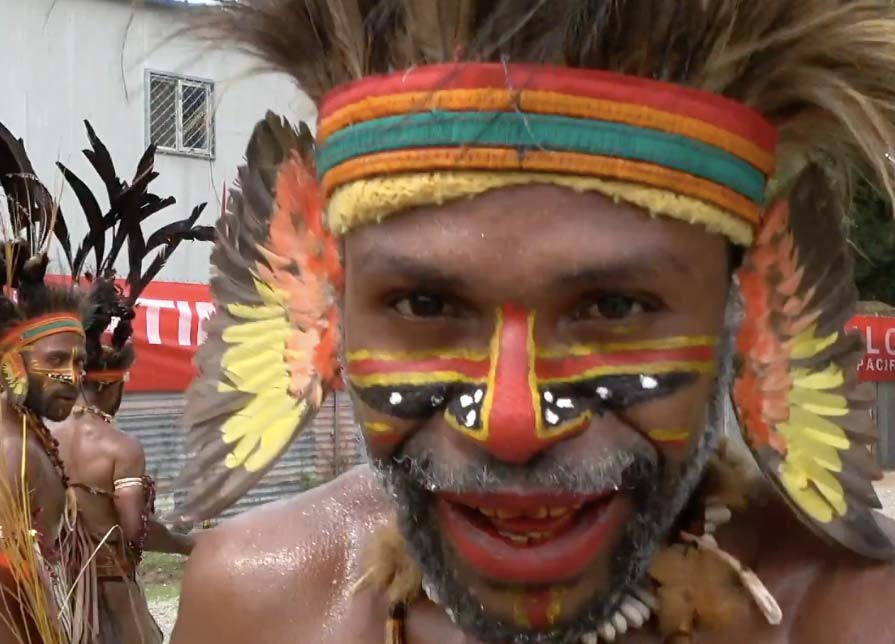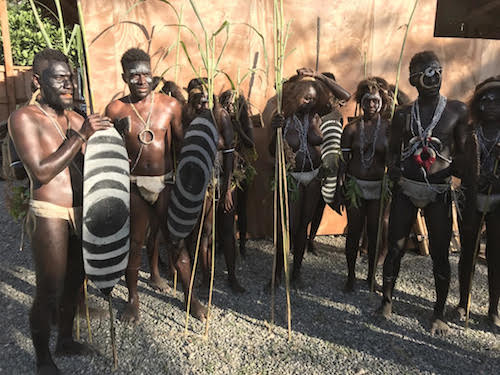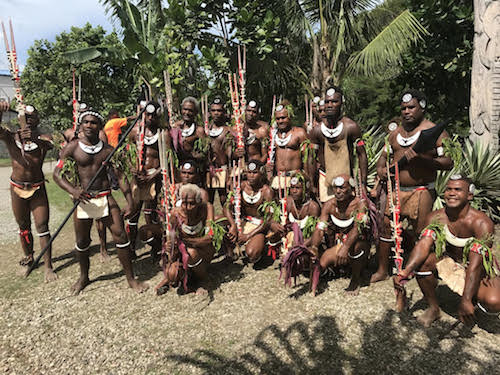WANTOKS: dance of resilience in Melanesia
BACKGROUND INFORMATION
On many of the small islands in Melanesia, indigenous people are still fighting for independence after decades—or centuries—of occupation. Below, you can find information about the struggles against colonization in Melanesia, as well as explanations of some of the key terms that appear in the film.

Photo credit: Free West Papua Campaign
-
- Melanesia is a group of islands in Oceania.
“From northwest to southeast, the islands form an arc that begins with New Guinea (the western half of which is called Papua and is part of Indonesia, and the eastern half of which comprises the independent country of Papua New Guinea) and continues through the Solomon Islands, Vanuatu (formerly New Hebrides), New Caledonia, Fiji, and numerous smaller islands.”
Source: Encyclopedia Britannica
- Melanesia is a group of islands in Oceania.
-
 The term “wantok” means “one talk” and originates from the Creole language Tok Pisin that is spoken in Papua New Guinea. In Melanesia, it is used to mean “from the same language, and implies giving preference to kin in the expectation of a series of reciprocal obligations being fulfilled,” according to the Solomon Islands Historical Encyclopedia.
The term “wantok” means “one talk” and originates from the Creole language Tok Pisin that is spoken in Papua New Guinea. In Melanesia, it is used to mean “from the same language, and implies giving preference to kin in the expectation of a series of reciprocal obligations being fulfilled,” according to the Solomon Islands Historical Encyclopedia.
“The exact origin of the term is unknown, although wantok may date back to the formative period of Pijin English on trading and labour trade ships travelling through Melanesia, or to work groups on plantations in Queensland, Fiji and Samoa in the final decades of the nineteenth century. The word was in use on plantations within the Solomons as far back as the 1920s and 1930s. Once wantoks are outside of their village situation, where everyone spoke one language, the same-language social category applies, particularly in urban, school or plantation/work situations. As Tarcisius Tara Kabutaulaka observes, over time wantokism became a term used ‘to identify people from the same region or island to distinguish them from outsiders, even if they speak a different language’. (Kabutaulaka 1998, 24) In its broadest form it identifies all Solomon Islanders as one people, or even all Melanesians as one people, if they are abroad. An added complication in the Solomons is that there are also substantial Polynesian and Micronesian communities, which practiced their own type of wantokism but also became part of the nation, broadening the base of the concept.”
-
- The Kanaks are the indigenous peoples of New Caledonia, which is known as Kanaky to its indigenous population. According to the International Work Group for Indigenous Affairs, the Kanak people have been demanding their right to self-determination and independence from France since 1975.Source: International Work Group for Indigenous Affairs
-
- In 2018, New Caledonia held a referendum on independence from France. New Caledonia has been an overseas territory of France since 1853, when Napoleon III claimed the territory. 45 percent of the territory’s 270,000 inhabitants are indigenous Kanaks who support independence, but they lost the referendum when 56 percent of voters chose to remain a part of France on November 4, 2018.
“Tensions have long run deep between pro-independence indigenous Kanaks and descendants of colonial settlers who remain loyal to Paris. “Over the past decade, relations between the two groups have improved markedly, but the no vote outcome was well below some early polls, which could encourage nationalists to try for a new referendum in coming years.

“During a visit to the archipelago in May, [French president] Macron acknowledged the ‘pains of colonisation’ and saluted the ‘dignified’ campaign for autonomy led by the Kanaks. He and his administration sought to strike a neutral tone on the vote. “New Caledonia’s economy is underpinned by French annual subsidies of some €1.3 billion ($US1.48 billion), nickel deposits that are estimated to represent 25% of the world’s total, and tourism. “It enjoys a large degree of autonomy but depends heavily on France for matters such as defence and education. Its position gives France a foothold in the Indo-Pacific region where China is expanding its presence.”
Source: The Guardian
- In 2018, New Caledonia held a referendum on independence from France. New Caledonia has been an overseas territory of France since 1853, when Napoleon III claimed the territory. 45 percent of the territory’s 270,000 inhabitants are indigenous Kanaks who support independence, but they lost the referendum when 56 percent of voters chose to remain a part of France on November 4, 2018.
-
 West Papua is occupied by Indonesia. West Papua comprises the western half of the island of New Guinea. According to the Free West Papua Campaign, the Dutch first colonized the region in 1898 and maintained control until 1963, when the United States helped arrange for control to transfer to the Indonesian government. But despite decades of occupation, indigenous West Papuans continue their fight for self-determindation.
West Papua is occupied by Indonesia. West Papua comprises the western half of the island of New Guinea. According to the Free West Papua Campaign, the Dutch first colonized the region in 1898 and maintained control until 1963, when the United States helped arrange for control to transfer to the Indonesian government. But despite decades of occupation, indigenous West Papuans continue their fight for self-determindation.
“In recent years a new independence organisation, the KNPB (National Committee for West Papua) has become prominent. Under its guidance huge independence rallies have been held across West Papua and the West Papuan’s voice is united more than ever. As a result, many of its members have been arrested, tortured and killed. In 2012, the KNPB chairman Mako Tabuni was killed by Indonesian police, whilst many others face lengthy jail sentences of up to fifteen years just for raising the West Papuan flag. “Today West Papua’s tragedy continues with ongoing reports of villages being burnt, Papuans being arrested, tortured and shot and the beautiful natural wilderness being devastated by logging, mining, agricultural and biofuel interests.”
Source: Free West Papua Campaign
